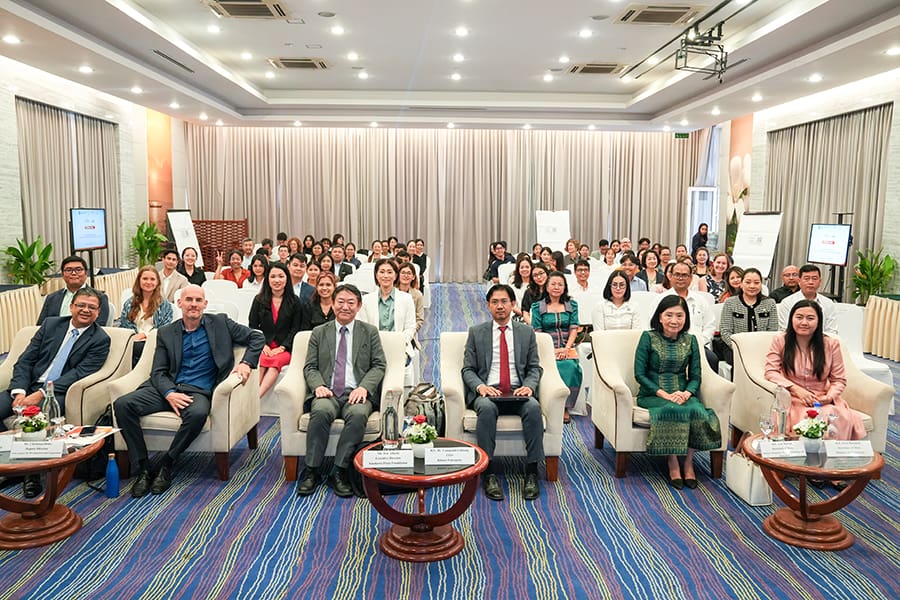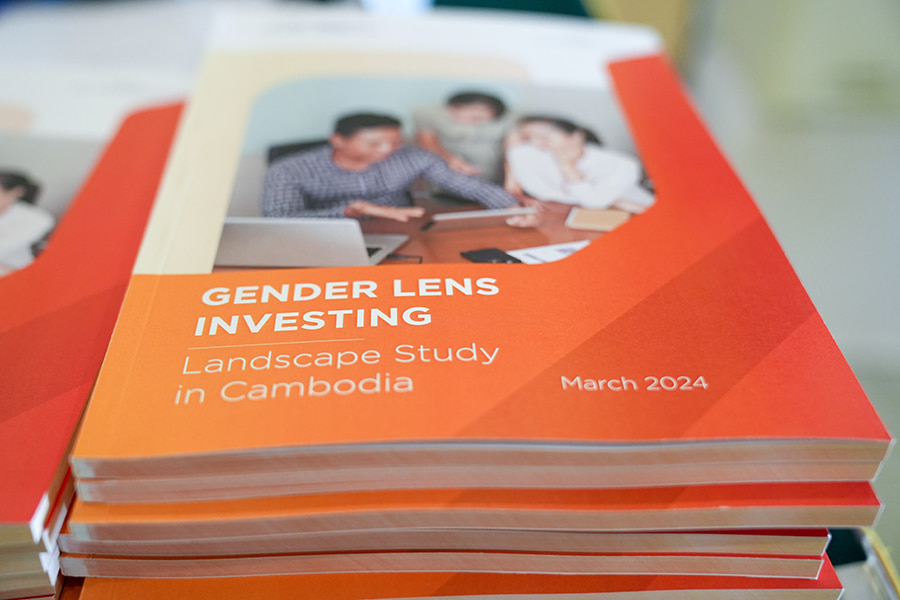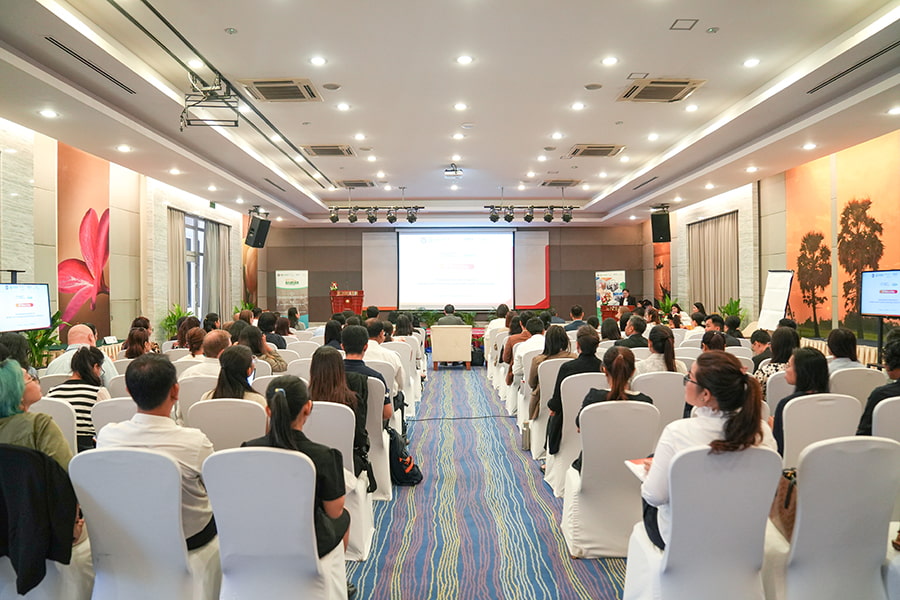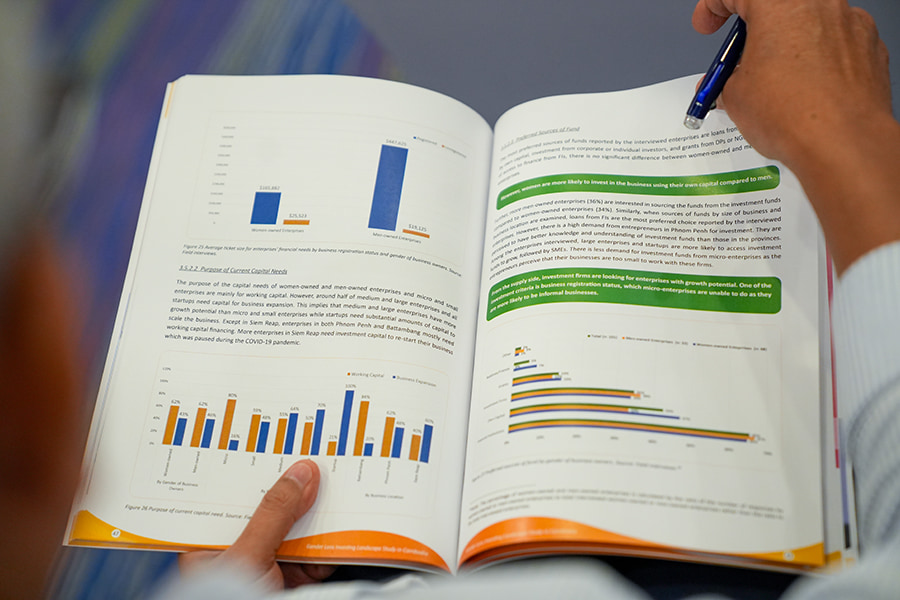21st Give A Day: Gender Lens Investing Study Findings In Cambodia
Swisscontact, Khmer Enterprise, the Swiss Agency for Development and Cooperation (SDC) and the Korea International Cooperation Agency (KOICA), in collaboration with the Sasakawa Peace Foundation (SPF), co-hosted the 21st ‘Give a Day’ to disseminate key findings from the SPF’s 'Gender Lens Investing (GLI) Landscape Study in Cambodia'.
The study was conducted by the SPF in 2023 in Phnom Penh, Siem Reap and Battambang, with the aim of understanding and addressing challenges and opportunities in integrating gender considerations into investment practices.

The 21st Give a Day was held at the Hotel Cambodiana in Phnom Penh on March 6, 2024. Delivering the welcoming remarks, Itsu Adachi, Executive Director of the SPF, shared that the GLI study report hopes to promote a more inclusive entrepreneurial ecosystem in Cambodia, where entrepreneurs can fulfil their potential and contribute to the country’s economic growth, as well as the creation of a more equitable and prosperous society.
H.E. Dr. Chhieng Vanmunin, CEO of Khmer Enterprise (KE), also stated during his keynote that KE has been supporting 'Give a Day' since 2021, and believes that this monthly-held event embodies the spirit of mutual support and the belief in untapped potential, aligning with Khmer Enterprise’s strategy to strengthen the entrepreneurial ecosystem and foster collaboration.
“The ecosystem is broad, and Gender Lens Investing is one of the focuses this month, highlighting our commitment to fostering inclusive growth,” said Vanmunin. “By incorporating gender perspectives into our strategies, the ecosystem will not only generate social impact but also unlock new opportunities for sustainable development.”
Breaking Down Gender Lens Investing In Cambodia

The definition of Gender Lens Investing (GLI) can vary, however, Etsuko Ito, Programme Officer of the Gender Investment and Innovation Program, explained to B2B Cambodia that the concept aims to channel capital towards women-led, or women-owned, businesses, as well as companies that promote women or provide services to support women.
Besides applying a ‘gender lens’ to investment decision-making, investment firms taking up GLI may also assess their capacity to promote gender diversity within their own workforce.
“If we can mobilise capital for gender lens investing, it will obviously support women's economic and socio-economic empowerment," she said.
Ito further emphasised that the purpose of this study was to determine Cambodia’s current understanding and operationalisation of GLI, so that the country can better mobilise available funds in the region.
For this study, the main aim was to identify key stakeholders, financial gaps, and potential drawbacks, with the overarching goal of formulating a comprehensive strategy to foster a robust GLI ecosystem in Cambodia, while contributing to the country’s achievement of the Sustainable Development Goal (SDG) for Gender Equality and women’s economic empowerment.
What Are The Key Findings From The Sasakawa Peace Foundation’s Gender Lens Investing Study?
Awareness Of Gender Lens Investing In Cambodia
According to the study findings, the majority of enterprises in Cambodia are unaware of whether they have integrated a ‘gender lens’ into their operations. The report analysis, based on information provided by participants and the study's definition of GLI, indicates that approximately 90 per cent of interviewed enterprises could be classified as ‘GLI enterprises’, primarily falling into the categories of women-owned and women-led enterprises.
The study also found that the ‘gender lens’, particularly from the perspective of female customers, is highly prevalent in the financial sector, whereby the majority of customers are also women.
Unequal Financial Access Based On Gender
The study reveals that among the enterprises interviewed, 48 per cent obtained loans from financial institutions (FIs) within the last two years. Large enterprises accounted for 77 per cent of loan recipients, while medium enterprises accounted for 53 per cent, small enterprises for 68 per cent, microenterprises for 39 per cent, and startups for 11 per cent.
A higher percentage of male-owned enterprises (50 per cent) obtained loans compared to women-owned enterprises (46 per cent). The average loan amount received by women-owned enterprises over the past two years was USD $240,000, which was lower than that of male-owned enterprises (USD $284,500).

Additional Study Findings:
- The financial needs of women-owned enterprises amount to approximately USD $6.4 billion while male-owned enterprises only account for about USD $4.1 billion.
- Gender-inclusive practices in the enterprises have a positive correlation with social impact.
- Out of the 56 per cent that reported receiving technical assistance, 68 per cent were women-owned enterprises and 32 per cent were owned by men.
- Women-owned enterprises receive slightly higher technical support from external stakeholders than those owned by men. Microenterprises receive less support than startups, large enterprises, and SMEs.
- There is a significant difference between the needs of women-owned and male-owned enterprises, with women-owned enterprises consistently reporting a higher demand for support on financial facilitation, skills, and market access.
The State Of Gender Lens Investing In Cambodia
The study notes that challenges for GLI implementation in Cambodia are caused by existing social and cultural norms, as well as the lack of successful case studies, GLI tools, GLI enterprise tracking data, government incentives, and GLI investment readiness. The report concluded that while GLI is still a nascent concept in Cambodia, there is significant untapped potential and promising indications for its growth.
Some development partners and international non-governmental organisations (INGOS) have adopted gender equality and social inclusion (GESI), gender and youth social inclusion (GYSI), and gender equality and social diversity and inclusion (GESDI), among other terms, reflecting a growing interest in these principles. Several entrepreneurial support organisations (ESOs) and investors in Cambodia are also beginning to implement GLI.
Some male-owned enterprises were found to have already naturally incorporated GLI principles by prioritising gender diversity and inclusion within their workforce and value chain. Moreover, the study concludes that Cambodia offers diverse opportunities for GLI implementation, especially given that gender equality ranks high on the government's agenda, with women recognised as pivotal to the economy.

Additional Study Findings:
- Significant untapped market opportunities for financing were found to exist in Cambodia. Estimates indicate that the country faces financial needs totaling approximately USD $10.5 billion, with women-owned enterprises requiring around USD $6.4 billion, compared to USD$4.1 billion for male-owned enterprises.
- In light of global and regional trends favouring GLI and expectations from funders, numerous ESOs and investors in Cambodia express keen interest in adopting GLI practices in the foreseeable future. Furthermore, there is a growing awareness of the importance of gender inclusivity and diversity in business circles.